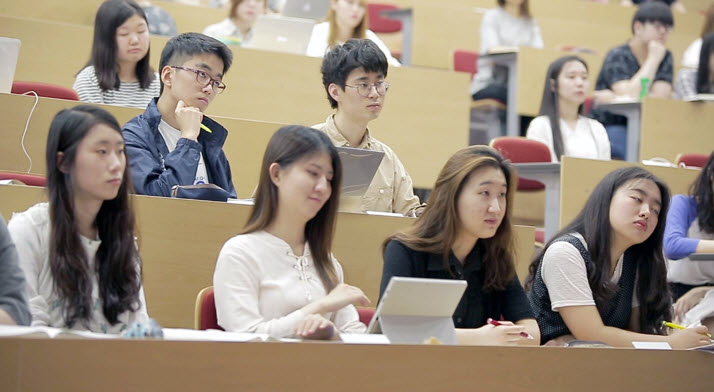
A classroom of the Department of Economics at SNU
SNU is implementing significant changes to the relative evaluation grading system for the first time in 14 years. Such changes stem from criticism that the system induces competition for higher grades and undermines the quality of higher education in Korea.
This year, SNU’s Faculty of Liberal Education, the body that manages the undergraduate general curriculum, adjusted the grading system of general education writing courses from relative evaluation to absolute evaluation. The faculty is now considering whether to expand the absolute evaluation system to other general education subjects such as foreign language, mathematics, and science.
In the relative evaluation system, students are graded on a curve, with 20 percent of students receiving an A grade, 30 to 40 percent receiving a B, and 30 to 50 percent receiving a C grade or below. The new absolute evaluation system offers professors the freedom to assign grades without set proportions.
This year, SNU also introduced a new grading policy for students taking courses outside of their own department. In order to encourage students to explore other subjects without worrying about competition for high grades, the new policy allows for students to receive up to 9 credits on a pass/fail (S/U) basis, rather than on the traditional A-to-F grade scale.
Recent changes in SNU’s grading policies have attracted much attention, considering that the Ministry of Education has long enforced the relative evaluation system.
Until the early 2000’s, most courses at Korean universities were largely graded on absolute evaluation systems. As the employment crisis grew worse in 1997 following the financial crisis, however, grade inflation became a serious issue. The government began to enforce relative evaluation systems and cut subsidies to universities with widespread grade inflation.
Many are now challenging the Ministry of Education to evaluate the current grading regulations in Korean universities. "The essence of a college education should lie not in competition among classmates but rather in developing the mind through exploration, cooperation and debate,” stated an SNU emeritus professor, “If change doesn’t continue to happen in Korea, universities will soon face a grave identity crisis in the coming years.”
Translated from: http://land.hankyung.com/news/app/newsview.php?aid=2018031661791
Written by Frances Seowon Jin, SNU English Editor, seowonjin@snu.ac.kr
Reviewed by Professor Travis Smith, Department of Asian Languages and Civilizations, tlsmith@snu.ac.kr

